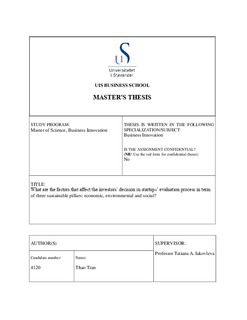| dc.contributor.advisor | Iakovleva, Tatiana | |
| dc.contributor.author | Tran, Thao | |
| dc.coverage.spatial | Norway | nb_NO |
| dc.date.accessioned | 2019-09-26T09:03:23Z | |
| dc.date.available | 2019-09-26T09:03:23Z | |
| dc.date.issued | 2019-06 | |
| dc.identifier.uri | http://hdl.handle.net/11250/2618909 | |
| dc.description | Master's thesis in Business Innovation | nb_NO |
| dc.description.abstract | The contemporary investment nowadays is showing more and more favours to new business model which focuses on the direction of sustainability by maximizing the balance value among social, environmental and financial dimensions. At the same time, the investment industry also witnesses a shift in increasing deals in startups’ early-stage while the role of responsible investment and development receives a surging attention from many nations worldwide, including Norway. Despite that necessity, there is lack of studies with regard to evaluation model encouraging sustainable investment and therefore, in accordance with this context, a research question is formed in this paper: What are the factors that affect the investors’ decision in startups’ evaluation process in term of three sustainable pillars: economic, environmental and social?
The investigation process is conducted by a parallel observation method between the literature’ inspection and qualitative research approach of six in-depth interviews with reputable funding organisations in Norwegian startups’ investment industry. During the analysing step, the linkage of key findings between primary and secondary data is put into consideration carefully.
The collected insights demonstrates that investment industry in Norway is showing a really positive attitude towards sustainability as the investors are also catching up very well with identifying the potential growing sectors. There are some identical patterns in investment strategy among firms, for instance portfolio’s diversification is the common route in risk management, network’ assistant is the reliable source externally in doing due diligence and the human factor is trusted as a key indicator in recognizing whether a startup can be successful or not.
Furthermore, based on the Idea Model of Dr. Bruton, I propose an evaluation tool which comprises a list of statements measuring the idea’ impact and feasibility by scoring four primary factors, i.e. targeted customer, value proposition, engaged people and offering – core competencies. As the heart of the suggested model lies in sustainability goal, I believe the discovery will contribute as an assisting tool for not only startups to raise awareness concerning the social and ecological value but also for investors to make better decision regarding sustainable objective. | nb_NO |
| dc.language.iso | eng | nb_NO |
| dc.publisher | University of Stavanger, Norway | nb_NO |
| dc.relation.ispartofseries | Masteroppgave/UIS-HH/2019; | |
| dc.rights | Navngivelse-Ikkekommersiell-DelPåSammeVilkår 4.0 Internasjonal | * |
| dc.rights | Navngivelse-Ikkekommersiell-DelPåSammeVilkår 4.0 Internasjonal | * |
| dc.rights.uri | http://creativecommons.org/licenses/by-nc-sa/4.0/deed.no | * |
| dc.subject | administrasjon | nb_NO |
| dc.subject | innovasjon | nb_NO |
| dc.subject | sustainability | nb_NO |
| dc.subject | investment | nb_NO |
| dc.subject | evaluation | nb_NO |
| dc.subject | startup | nb_NO |
| dc.subject | økonomi | nb_NO |
| dc.title | What are the factors that affect the investors’ decision in startups’ evaluation process in term of three sustainable pillars: economic, environmental and social? | nb_NO |
| dc.type | Master thesis | nb_NO |
| dc.subject.nsi | VDP::Social science: 200::Economics: 210::Business: 213 | nb_NO |

